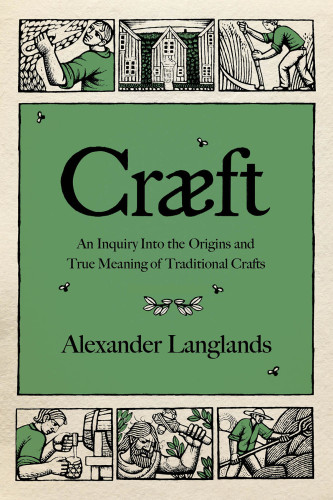
Cræft
An Inquiry Into the Origins and True Meaning of Traditional Crafts
کتاب های مرتبط
- اطلاعات
- نقد و بررسی
- دیدگاه کاربران
نقد و بررسی

October 1, 2017
Tracing human existence from prehistory on, a historian celebrates resourcefulness and skill.British archaeologist and medievalist Langlands (Medieval History/Swansea Univ.), presenter of the BBC series VictorianFarm and Edwardian Farm, makes his literary debut with a delightful, informative melding of memoir and history. Like Ruth Goodman did in her books How to be a Victorian (2014) and How to be a Tudor (2016), Langlands conveys the reality of daily life in earlier times, focusing especially on "physical adeptness, strength and fitness" along with hard-won wisdom about materials and techniques, all components of craeft. He believes that society today is "going backwards," relying on machines that have rendered us "lazy, stupid, desensitised and disengaged." On his journey of discovery, Langlands finds evidence of craftiness in museums, such as the Museum of Welsh Life, where he investigated beekeeping; and an Icelandic farmstead museum containing implements and artifacts of daily life: a cornucopia of tools and gear, along with "skilfully made baskets, chests and trunks" to hold them. Much of what he learned came from his own determined efforts. "As is often the case with my experimental historical crafts addiction," he admits as he faced the challenge of making a thatched roof, "one extremely long and arduous task leads to another extremely long and arduous task." The author discloses the complex processes involved in creating items we take for granted: woolen fabric, for example, requires an understanding of "how fleeces translate into fibres, how fibres translate into yarns, how both respond to dyes," and how yarn becomes fabric for particular uses. The tanning of hides into leather is similarly complicated, with multiple steps of cleaning, preserving, and drying. Farming, haying, weaving, basketry, and boat-making are some of the crafts Langlands describes in fascinating detail as he travels through time and place. He regrets that workmanship is no longer revered: "we have become detached from making," he writes, "and it isn't a good state for us to be in."Humans are makers, the author argues persuasively in this illuminating book, in need of renewed connection to the intelligence and ingenuity of craft.
COPYRIGHT(2017) Kirkus Reviews, ALL RIGHTS RESERVED.

Starred review from October 30, 2017
Archeologist and BBC presenter Langlands brings his approachable voice and unique firsthand experience to this exploration of the history behind traditional crafts. Despite its modern usage, craft—or
cræft, in Old English—is about more than just making; it also connotes the knowledge and resourcefulness needed to adapt in the face of changing materials and circumstances. Through a series of short histories focused on such crafts as thatching, weaving, and leather making, Langlands recovers craft as a model for a more engaged, resilient, and sustainable way of life. Interlacing each history with accounts of his own attempts to practice traditional crafts, Langlands reveals the intricate balancing acts required by craft processes while also reflecting broadly on human interactions with landscapes. Langlands makes a strong, if sometimes unnuanced, argument against the mindlessness of modern consumption, urging readers to prioritize long-term use over profitability and disposability. In the ingenuity of craft, he sees not dead tradition but rather a way forward for an uncertain, unstable world. Sustained by Langland’s clear yet lyrical prose, this book is sure to interest readers concerned with history, human know-how, and the future of this Earth. Illus.

November 15, 2017
Inspired by several BBC historical re-creation series including Victorian Farm (2008), which Langlands (lecturer, Swansea Univ.; The Ancient Ways of Wessex) participated in, this book dissects medieval British craeft as a lost amalgam of "knowledge, power, skill." The intersection of the author's archaeological background and love of historical farming yields a fascinating analysis of the disappearing arts of wattlework, hedgerow maintenance, thatch rooves, pond making, pottery, and basket weaving. "To be craefty is all about resourceful living and about going back to the basics: a mindful life achieved through beautiful simplicity." It's not just about how you replicate the arts in the modern sense, but what we can learn about past civilizations of Great Britain. The enduring virtues of increasingly obscure tools such as scythes, pitchforks, skeps (straw beehives) and hedging hooks are extolled. Langlands isn't only writing about research, he's actually farming in his daily life with these lost arts. He's a living experiment, just as he depicted in his television work. VERDICT An engaging read imparting a wealth of historical knowledge with a touch of infotainment. With the current interest in authentic arts and handmade goods, this unparalleled scholarly work will appeal to both specialists and casual readers.--Jessica Bushore, Xenia, OH
Copyright 2017 Library Journal, LLC Used with permission.

























دیدگاه کاربران